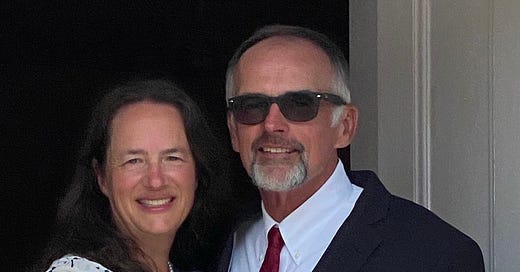
The new anti-abortion law in Texas is not just about abortion; it is about undermining civil rights decisions made by the Supreme Court during the 1950s, 1960s, and 1970s. The Supreme Court declined to stop a state law that violates a constitutional right.
Since World War II, the Supreme Court has defended civil rights from state laws that threaten them. During the Great Depression, Democrats under President Franklin Delano Roosevelt began to use the government to regulate business, provide a basic social safety net—this is when we got Social Security—and promote infrastructure. But racist Democrats from the South balked at racial equality under this new government.
After World War II, under Chief Justice Earl Warren, a Republican appointed by President Dwight Eisenhower, and Chief Justice Warren Burger, a Republican appointed by Richard Nixon, the Supreme Court set out to make all Americans equal before the law. They tried to end segregation through the 1954 Brown v. Board of Education of Topeka, Kansas, decision prohibiting racial segregation in public schools. They protected the right of married couples to use contraception in 1965. They legalized interracial marriage in 1967. In 1973, with the Roe v. Wade decision, they tried to give women control over their own reproduction by legalizing abortion.
They based their decisions on the due process and the equal protection clauses of the Fourteenth Amendment, passed by Congress in 1866 and ratified in 1868 in the wake of the Civil War. Congress developed this amendment after legislatures in former Confederate states passed “Black Codes” that severely limited the rights and protections for formerly enslaved people. Congress intended for the powers in the Fourteenth to enable the federal government to guarantee that African Americans had the same rights as white Americans, even in states whose legislatures intended to keep them in a form of quasi-slavery.
Justices in the Warren and Burger courts argued that the Fourteenth Amendment required that the Bill of Rights apply to state governments as well as to the federal government. This is known as the “incorporation doctrine,” but the name matters less than the concept: states cannot abridge an individual’s rights, any more than the federal government can. This doctrine dramatically expanded civil rights.
From the beginning, there was a backlash against the New Deal government by businessmen who objected to the idea of federal regulation and the bureaucracy it would require. As early as 1937, they were demanding an end to the active government and a return to the world of the 1920s, where businessmen could do as they wished, families and churches managed social welfare, and private interests profited from infrastructure projects. They gained little traction. The vast majority of Americans liked the new system.
But the expansion of civil rights under the Warren Court was a whole new kettle of fish. Opponents of the new decisions insisted that the court was engaging in “judicial activism,” taking away from voters the right to make their own decisions about how society should work. That said that justices were “legislating from the bench.” They insisted that the Constitution is limited by the views of its framers and that the government can do nothing that is not explicitly written in that 1787 document.
This is the foundation for today’s “originalists” on the court. They are trying to erase the era of legislation and legal decisions that constructed our modern nation. If the government is as limited as they say, it cannot regulate business. It cannot provide a social safety net or promote infrastructure, both things that cost tax dollars and, in the case of infrastructure, take lucrative opportunities from private businesses.
It cannot protect the rights of minorities or women.
Their doctrine would send authority for civil rights back to the states to wither or thrive as different legislatures see fit. But it has, in the past, run into the problem that Supreme Court precedent has led the court to overturn unconstitutional state laws that deprive people of their rights (although the recent conservative courts have chipped away at those precedents).
The new Texas law gets around this problem with a trick. It does not put state officers in charge of enforcing it. Instead, it turns enforcement over to individual citizens. So, when opponents sued to stop the measure from going into effect, state officials argued that they could not be stopped from enforcing the law because they don’t enforce it in the first place. With this workaround, Texas lawmakers have, as Justice Stephen Breyer noted in his dissent, “delegate[d] to private individuals the power to prevent a woman from…[exercising]...a federal constitutional right.”
Justice Sonia Sotomayor was more forceful, calling the measure “a flagrantly unconstitutional law engineered to prohibit women from exercising their constitutional rights and evade judicial scrutiny.” And yet, the Supreme Court permitted that state law to stand simply by refusing to do anything to stop it. As Sotomayor wrote in her dissent: “Last night, the Court silently acquiesced in a State’s enactment of a law that flouts nearly 50 years of federal precedents.”
A state has undermined the power of the federal government to protect civil rights. It has given individuals who disagree with one particular right the power to take it away from their neighbors. But make no mistake: there is no reason that this mechanism couldn’t be used to undermine much of the civil rights legislation of the post–World War II years.
On September 4, 1957, three years after the Brown v. Board of Education decision, a crowd of angry white people barred nine Black students from entering Central High School in Little Rock, Arkansas. The white protesters chanted: “Two, four, six, eight, we ain’t gonna integrate.”
In 1957, Republican President Dwight Eisenhower used the federal government to protect the constitutional rights of the Little Rock Nine from the white vigilantes who wanted to keep them second-class citizens. In 2021, the Supreme Court has handed power back to the vigilantes.
—-
Notes:
https://www.supremecourt.gov/opinions/20pdf/21a24_8759.pdf








This once upon a time Alabama practicing attorney tries to imagine legions of self-righteous pro-lifers shutting down the Texas courts, which have not the personnel nor judges to process legions of private bounty hunter lawsuits.
I try to imagine the self-righteous pro-lifers proving in court that a woman who went to Planned Parenthood, or anywhere, actually had an abortion there. Aren't medical records privileged?
What lawyer would take such a case with only a possible $10,000 bounty reward? Perhaps a lawyer who had hundreds of such cases on a 50 percent contingency fee.
If I were a lawyer defending such cases, I would put the self-righteous plaintiffs on the witness stand and ask them if they are Christians?
After they say, Yes, I ask them if they ever raised on their dime an unwanted baby to prevent an abortion?
After they say, No, I ask them if they ever offered to raise on their dime an unwanted child to prevent an abortion?
After they say, No, I ask them if they are not guilty of not trying to save unwanted babies, thus they killed the unwanted babies?
After they say, No, I ask the judge to dismiss the lawsuit, based on the plaintiffs' sworn testimony that they are guilty of killing unwanted babies.
If the judge then gleefully dismisses the lawsuits, the plaintiffs can appeal.
If the judge ignores the evidence and does not dismiss the lawsuits, I ask the plaintiffs if they if read the Bible?
After they say, Yes, I ask them if the Bible is the inerrant, literal word of God?
After they say, Yes, I hand them a New King James Bible and ask them to open it to Genesis 2:7 and read it to the court:
"And the LORD God formed man of the dust of the ground, and breathed into his nostrils the breath of life; and man became a living being."
I ask the judge to dismiss, based on the plaintiffs' sworn testimony life begins with the first breath of life.
If the judge gleefully rules against the plaintiffs, then the plaintiffs can appeal.
If the judge ignores the evidence and rules with the plaintiffs, then I file the appeals.
I get on Oprah.
NPR has me on the air.
I am vilified on FOX News.
I am preached and prophesied against in evangelical churches.
I am shot and killed leaving the courthouse.
The shooter claims it was to prevent me killing any more babies.
The State Attorney prosecutes me in the grave.
I put the State Attorney on the witness stand and ask if he/she's a Christian?
Texas lawyers and pro se defendants adopt my legal strategy.
The Texas courts are choked to death and unable to handle other kinds of cases.
FOX News and he Christian right go haywire.
The US Supreme Court gets a chance to rule on Genesis 2:7.
The right wing loves religious exemptions so perhaps there should be one here.
This is from Rabbi Danny Horwitz.
I once had to counsel a woman to get an abortion.
Years ago, I was the rabbi of a congregation in greater Kansas City. I knew this woman had preexisting health issues and struggled to take care of the children she already had. Without sharing any other personal details, it was clear to me another pregnancy was going to push her over the edge.
Judaism teaches that potential life is sacred. Nevertheless, our religion also teaches that potential life is not the same as actual life, that a fetus is not a human being. This is directly derived from Scripture. Therefore, even during labor, the pregnant woman’s life has precedence over the life of the fetus. And if we have reason to believe a pregnancy will be a serious threat to the woman’s well-being, whether that be mentally, physically or otherwise, then she will be counseled to abort the fetus, and to do so in a way that maximally protects her own health.
Many books have been written about this, but these are the rules that guide Jewish law and those of us who seek to fulfill it in the practice of our religion. Each case is unique, but the principles remain the same. We would never celebrate the termination of potential life, but neither would we regard it as automatically forbidden. As my doctoral adviser, Rabbi Byron Sherwin, put it, “Judaism is neither pro-life or pro-choice. It depends on the life and it depends on the choice.”
Thus, when this woman came to me for direction, I told her not that she could have an abortion, but that she must have an abortion, that the God of my understanding would want her to do it.
My action would likely be considered a violation of SB 8, the new Texas law making it illegal to assist someone in pursuing an abortion. Thus, this law is a restriction on the practice of my religion. And it would likewise impose a religious standard upon anyone from any religion who believes abortion is not always the evil our state officials believe it to be.
This law cannot stand forever.